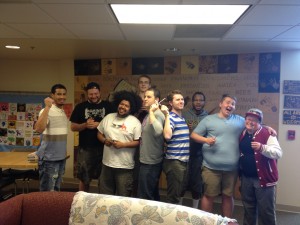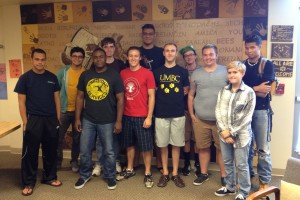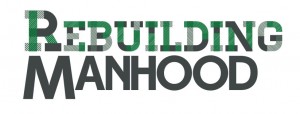Should I leave an empty seat between me and my buddy when we go to the movies?
What does it mean to “man up”?
Will I get my Man Card revoked if I don’t like sports?
How am I supposed to flirt with someone without coming off like a creep?
What kind of mustache best suits my face?
When is it acceptable for a man to show vulnerability?

Explore these questions and more through Rebuilding Manhood. Students will discuss gender roles, norms, and variations and will learn to build a healthy, multifaceted masculinity in a safe space with other UMBC men. Through the primary facilitation of male staff members, you will discuss topics related to being a man parallel to other important social identities and explore ways you can be an effective leader and ally for yourself, women, and others.
Rebuilding Manhood is an 11-week commitment. The group will meet weekly on Fridays from 2-3:15pm beginning Friday, September 11th, 2015. Group members are expected to attend all meetings and are asked to commit to some outside reading (15-20 minutes a week).
Apply online here or contact the Women’s Center for more information.
Fall application deadline: Friday, September 4th, 2015 at 4pm.
Still not sure If Rebuilding Manhood is for you?
Here’s a quick Q&A:
What is Rebuilding Manhood?
Rebuilding Manhood is a Women’s Center initiative that gathers UMBC undergraduate men together over the course of 11 weeks during the semester to explore manhood and gender in order to promote a healthy and multifaceted masculinity for oneself and throughout UMBC’s campus community.
Gender is a social construction and both manhood and womanhood in American have been constructed in ways that can be restrictive and damaging. In the Women’s Center, we talk about how these restrictions hurt women and box us into unrealistic expectations, but rarely is there a space for men to do the same. Rebuilding Manhood was created to provide that opportunity to men at UMBC. Through creating a supportive peer environment, Rebuilding Manhood is a space to deconstruct restrictive notions of masculinity that keep men boxed into prescribed ideas of what it means to “be a man.” Over the semester, the group works together to rebuild individual and collective definitions of manhood that promotes strong relationships, makes room for self-definition, and challenges all forms of violence. Moreover, Rebuilding Manhood provides important tools for leadership development, becoming a social change agent, and developing healthy relationships.
What does Rebuilding Manhood focus on?
Over the course of 11 weeks, group members discuss the issues that are most important to college men today. Topics include but are not limited to masculinity, relationships, consent, gender roles and stereotypes, pop culture and media, and social justice. Each week, we explore manhood, masculinity, and gender through an intersectional lens at individual, interpersonal, and systemic levels to encourage a better understanding of one’s own experiences as a man and provide skills to foster a healthy culture of masculinity on campus.
While each week has a set agenda and the group facilitators follow a sort of curriculum, each cohort’s experience is also totally different from the others. We allow for flexibility for group members to contribute to the curriculum and bring up topics or questions they might have. We have the ability to change the flow of the semester’s agenda to meet the needs of the group as needed.
Who can be a part of Rebuilding Manhood?
Over 50 UMBC men have participated in Rebuilding Manhood over the past three years. Former participants have included fraternity men, gamers, student athletes, gay men, trans men, SGA members, resident assistants, STRiVE participants, and more. You don’t have to be a Gender and Women’s Studies major to apply, in fact, we’ve had over 25 majors represented in Rebuilding Manhood to include: biochemistry, health administration & policy, political science, social work, theatre, economics, math, ancient studies, information systems, media communication studies, and mechanical engineering. They have come from racially diverse backgrounds, have various different religious identities, and were born and raised throughout the country and world. We have students complete an application of interest to ensure selected group members will be willing to engage in conversations, be accountable to themselves and each other, and offer a range of diverse experiences and perspectives.
So long story short? Any undergraduate student who identifies as a man and wants to spend time discussing manhood is welcome to apply!
Do I have to attend every meeting to be a part of Rebuilding Manhood?”
Yes, the curriculum is designed to build on material from the previous weeks and to ensure a rich/meaningful dialogue we ask that students commit to attending every week.
What is this outside reading you keep mentioning?
Eleven weeks sounds like a long time but when you add it up, each Rebuilding Manhood cohort only has less than 17 hours for the whole semester to be together. There simply isn’t enough time to introduce new topics and discuss them. The outside reading allows group members to be exposed to new topics and issues so that more time face-to-face time can be devoted to talking about those topics and issues. The required readings are brief and accessible, including selected chapters from books like Michael Kimmel’s Guyland and Shira Tarrant’s Men Speak Out. We’re also a big fan of sharing blogs and YouTube videos to bring in current and ongoing events related to gender and masculinity.
Is Rebuilding Manhood another leadership program?
The issues and concepts discussed each week will prepare participants to develop a healthy concept of masculinity and healthy relationships with others which can translate into an enhanced ability to lead others, but Rebuilding Manhood is not exclusively a leadership program.
How is this different from Green Dot or the Advocate Program?
While a lot of the content of Rebuilding Manhood deals with violence against women, gender-based violence, consent, and bystander intervention, this initiative is grounded in a social justice and intersectional feminist framework. By spending most of the time engaging men about issues related to traditional masculinity, male privilege, and manhood as an avenue to prevent gender-based violence and object to violence-supportive culture. Men who have gone through Green Dot training or have been a part of the advocate program have also done Rebuilding Manhood and we certainly recommend checking out these experiences as ways to complement the Rebuilding Manhood experience.
Still have questions?
That’s okay! If you still have questions or want to make sure Rebuilding Manhood is the right fit for you, there are plenty of other people you can talk to. Email or stop by the Women’s Center and we can get you connected to the Rebuilding Manhood facilitators and former Rebuilding Manhood group members.

